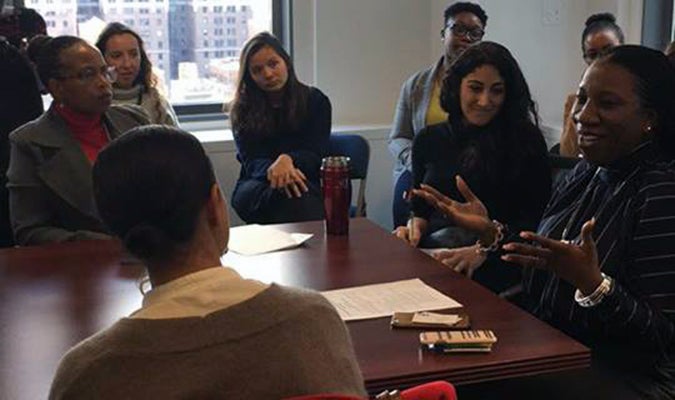Executive Director’s blog series: #MeToo has made us all responsible for change — Sexual Harassment in the Workplace
A 16-part blog series by UN Women Executive Director, Phumzile Mlambo-Ngcuka on the occasion of the 16 Days of Activism Against Gender-Based Violence campaign.Date:
The viral #MeToo social media conversation was unprecedented in opening up revelations of sexual violence and abuse in both private and public sectors. It has helped to publicly expose the scale and reach of sexual violence, and with that awareness, made us all responsible for change. We stand with the women who are finding their voice and summoning their courage to expose powerful men who prey on the less powerful.
The world is waking up to the fact that violence is not just ‘out there’ – it’s also right here. In fact, it’s everywhere, hidden in plain sight, normalized so we didn’t even see it.
This moment has exposed how men in authority can become serial perpetrators; how high the numbers of affected women are; how frightening it is for young women and young men to take on those predators, when the chances are that they will not be believed; and how a culture of entitlement, where there are no consequences for sexual crimes, has left women tormented. The survivors who have come forward and spoken about their experiences have given critical visibility to the devastating reality of the consequences they have faced, instead.
As the ‘Me Too’ movement gained momentum and spread across the globe, UN Women had the privilege of hosting its originator for discussions in New York. Tarana Burke is an organizer who has spent decades supporting survivors of sexual violence, especially young women of colour and discovered the release and support of “Me Too” over 10 years ago.
As organizations strive to create empowering work environments that condemn violence and empower employees to call it out, it is especially important that we pay attention to the distinct ways in which violence and misogyny intersect with other forms of marginalization on the basis of race, class, sexuality, religion, and ethnicity.
As Tarana told us, “Sexual violence knows no race, class, or gender, but the response to it does.”

Building empowering, respectful communities doesn’t just mean recognizing the existence of sexual violence -- it means recognizing the ways this violence affects every life differently, requiring different responses, resources, and support. To get to zero tolerance we must have 100 per cent accountability, with sanctions.
This is what we have to fight for everywhere, so the coming generations can be socialized differently and we can find our way to behaviour change that lasts.